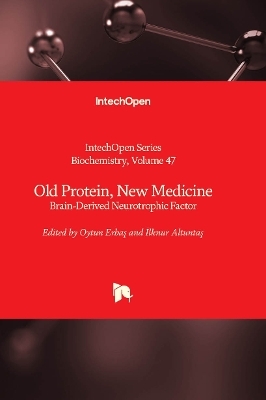
Old Protein, New Medicine
Brain-Derived Neurotrophic Factor
Seiten
2023
IntechOpen (Verlag)
978-1-83769-312-2 (ISBN)
IntechOpen (Verlag)
978-1-83769-312-2 (ISBN)
As a member of the protein family known as neurotrophins, brain-derived neurotrophic factor (BDNF) plays a crucial role in supporting healthy brain function, including synaptic plasticity, cellular differentiation, learning, and nerve cell survival. This book presents comprehensive information on BDNF and its role in promoting neuroprotection.
As a member of the protein family known as neurotrophins, brain-derived neurotrophic factor (BDNF) plays a crucial role in supporting healthy brain function, which includes synaptic plasticity, cellular differentiation, learning, and the survival of nerve cells. Neuronal plasticity refers to the nervous system’s ability to adapt and respond to environmental conditions, involving various structural and functional mechanisms that can lead to changes in neural circuits, the formation of new synapses, and the generation of fresh neurons. BDNF has emerged as a significant regulator of neuronal plasticity. It is worth noting that the pathophysiological processes underlying central nervous system disorders and neuropsychiatric conditions such as depression, anxiety, autism, and schizophrenia, as well as neurodegenerative diseases like Parkinson’s and Alzheimer’s, are influenced by BDNF. Due to its robust neuroprotective properties and recently discovered anti-inflammatory and anti-apoptotic characteristics, BDNF has long been considered a potential candidate for preventing neurodegeneration. In the context of autism spectrum disorder, BDNF holds great promise as a central focus for therapeutic efforts. Its significance extends to the field of spinal cord injury, where it assumes a multifaceted role in the intricate pathophysiological processes at play. BDNF functions as a catalyst for the growth of axons, a crucial step in the restoration of the nervous system following damage. In the context of sepsis, research into the potential of BDNF’s anti-inflammatory properties to mitigate organ damage is quite noteworthy. Additionally, current findings suggest that combining exercise with vitamin D may offer a promising approach to increase BDNF levels and improve brain health. This book presents comprehensive information on BDNF and its role in promoting neuroprotection. The chapters offer insights into recent developments, molecular principles, and innovative therapeutic approaches for neurodegenerative disorders and brain health.
As a member of the protein family known as neurotrophins, brain-derived neurotrophic factor (BDNF) plays a crucial role in supporting healthy brain function, which includes synaptic plasticity, cellular differentiation, learning, and the survival of nerve cells. Neuronal plasticity refers to the nervous system’s ability to adapt and respond to environmental conditions, involving various structural and functional mechanisms that can lead to changes in neural circuits, the formation of new synapses, and the generation of fresh neurons. BDNF has emerged as a significant regulator of neuronal plasticity. It is worth noting that the pathophysiological processes underlying central nervous system disorders and neuropsychiatric conditions such as depression, anxiety, autism, and schizophrenia, as well as neurodegenerative diseases like Parkinson’s and Alzheimer’s, are influenced by BDNF. Due to its robust neuroprotective properties and recently discovered anti-inflammatory and anti-apoptotic characteristics, BDNF has long been considered a potential candidate for preventing neurodegeneration. In the context of autism spectrum disorder, BDNF holds great promise as a central focus for therapeutic efforts. Its significance extends to the field of spinal cord injury, where it assumes a multifaceted role in the intricate pathophysiological processes at play. BDNF functions as a catalyst for the growth of axons, a crucial step in the restoration of the nervous system following damage. In the context of sepsis, research into the potential of BDNF’s anti-inflammatory properties to mitigate organ damage is quite noteworthy. Additionally, current findings suggest that combining exercise with vitamin D may offer a promising approach to increase BDNF levels and improve brain health. This book presents comprehensive information on BDNF and its role in promoting neuroprotection. The chapters offer insights into recent developments, molecular principles, and innovative therapeutic approaches for neurodegenerative disorders and brain health.
| Erscheinungsdatum | 01.06.2024 |
|---|---|
| Reihe/Serie | Biochemistry |
| Verlagsort | London |
| Sprache | englisch |
| Maße | 178 x 254 mm |
| Themenwelt | Naturwissenschaften ► Biologie ► Humanbiologie |
| Naturwissenschaften ► Biologie ► Zoologie | |
| ISBN-10 | 1-83769-312-9 / 1837693129 |
| ISBN-13 | 978-1-83769-312-2 / 9781837693122 |
| Zustand | Neuware |
| Informationen gemäß Produktsicherheitsverordnung (GPSR) | |
| Haben Sie eine Frage zum Produkt? |
Mehr entdecken
aus dem Bereich
aus dem Bereich
23 Techniken, um Stress abzubauen, Negativspiralen zu unterbrechen …
Buch | Softcover (2023)
FinanzBuch Verlag
CHF 25,20
produktiv sein ohne Stress – und mehr vom Leben haben
Buch | Softcover (2023)
dtv Verlagsgesellschaft
CHF 25,20
Wie Myrmecophile mit ihren Wirten interagieren
Buch | Softcover (2023)
Springer (Verlag)
CHF 97,95


